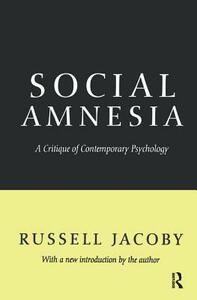Take a photo of a barcode or cover
i'd like to imagine the time period and audience russell jacoby directed his comments to as being the movement waning in the '70s from the '60s sense of indefatigable optimism inundated by disco and cynicism. that's unfair to disco. my lack of literacy in freud and marx -- or rather my minimal osmosed general understanding -- adjusted my apprehension of the topic. jacoby's treatment of marx is more of an aside (during which i had to ask a friend for clarity concerning whether marx believed in property; he does!, apparently), perhaps because the marxian frame is so deeply timestamped into his discursive context. it makes sense since marx traditionally is suspected of inspiring revolutionary activist action, and the need for function cadre is supported thusly. i guess i didn't realize how much freud accounts for contemplative hesitation, tripping, diffidence. jacoby's primary moral here is to make it clear to you that theory is not equivalent to therapy, is never attended to be. he figures freud's epigones as brat trying to muster a reparative easy way out from the patriarch. no dice. a glimpse of this genealogy illuminates a lot of thinkers i've found frustrating (edelman) where their inconsolable gripes grate and grate. boethius' *the consolation of philosophy* lamps on my shelf, and i'm suppressing the itch to let it maybe shed light on this reparative activist expectation from thought.
I read a single chapter from this book titled "Negative Psychoanalysis and Marxism." Jacoby defines negative psychoanalysis as that which "knows only a negative relationship; it examines the psychic forms that have diverted, impeded, or dissolved a historical and class consciousness" (99). As words such as "historical" and "class consciousness" suggest, Jacoby explores incorporating psychoanalysis and Marxism and the methods of realizing this incorporation. He suggests, "negative psychoanalysis is psychoanalysis refracted through Marxism" (99). In this way, negative psychoanalysis is a late-Freudian understanding of psychoanalysis. That is to say, negative psychoanalysis rejects a domesticated psychoanalysis (the early, pre-1920 Freudian psychoanalysis). Negative psychoanalysis is, properly understood, a psychoanalysis that embraces the necessity of failure. Again, from Jacoby: "If critical theory as negative psychoanalysis is not to succumb to the lure of the chase nor flee into old slogans, it must plumb the psychic depths for sounds of sadness and revolt" (100). This marriage of "sadness" and "revolt" is, broadly speaking, the union of psychoanalysis and Marxism. A more affirmative psychoanalysis may attempt to articulate an existence beyond lack, an existence beyond subjectivity even. This mirrors a more affirmative Marxism that understands the struggle against capitalism as one that will inevitably lead to harmonious utopianism (e.g., Marx's "hunt in the morning, fish in the afternoon, rear cattle in the evening, criticise after dinner").
"What Georg Lukács did for Marxism in 'What is Orthodox Marxism?' has not been done for Freudianism." (12-13)
"If the history of psychology is the history of forgetting, Adler was the first, but by no means the last, to forget." (44)
Russell Jacoby explores the betrayal of psychological radicalism by Alfred Adler, which Jacoby argues has imbued major psychological currents following Freudianism. For Jacoby, the Frankfurt School thinkers György Lukács, Theodor Adorno, Walter Benjamin, and Herbert Marcuse represent the other side of psychoanalysis. Rather than distorting and repressing the radical implications of psychoanalysis, by individualising its application and minimising the influence of society, the Frankfurt School thinkers embraced them, and fixed their gaze on the mass culture which their contemporaries refused to engage with. Furthermore, they embraced the radical subjectivity inherent in psychoanalysis, without shoehorning their understanding of society into a reductionist sociology which attempted to reduce the world to economics (as in vulgar Marxism) or radical subjectivity (as in the psychology of Cooper and Laing). Americanisation of psychoanalysis destroyed its radical core, psychoanalysis became a 'how to guide' (see [b:The Art of Loving|14142|The Art of Loving|Erich Fromm|https://i.gr-assets.com/images/S/compressed.photo.goodreads.com/books/1438550243l/14142._SY75_.jpg|1561022]), a boutique good, a one-stop shop fix-all therapy. Freudianism died and, in its place, an even more conformist psychology took place...
"If the history of psychology is the history of forgetting, Adler was the first, but by no means the last, to forget." (44)
Russell Jacoby explores the betrayal of psychological radicalism by Alfred Adler, which Jacoby argues has imbued major psychological currents following Freudianism. For Jacoby, the Frankfurt School thinkers György Lukács, Theodor Adorno, Walter Benjamin, and Herbert Marcuse represent the other side of psychoanalysis. Rather than distorting and repressing the radical implications of psychoanalysis, by individualising its application and minimising the influence of society, the Frankfurt School thinkers embraced them, and fixed their gaze on the mass culture which their contemporaries refused to engage with. Furthermore, they embraced the radical subjectivity inherent in psychoanalysis, without shoehorning their understanding of society into a reductionist sociology which attempted to reduce the world to economics (as in vulgar Marxism) or radical subjectivity (as in the psychology of Cooper and Laing). Americanisation of psychoanalysis destroyed its radical core, psychoanalysis became a 'how to guide' (see [b:The Art of Loving|14142|The Art of Loving|Erich Fromm|https://i.gr-assets.com/images/S/compressed.photo.goodreads.com/books/1438550243l/14142._SY75_.jpg|1561022]), a boutique good, a one-stop shop fix-all therapy. Freudianism died and, in its place, an even more conformist psychology took place...

